Student Union
- By Aline Barros
Visa Delays Hinder Foreign Student Job Prospects
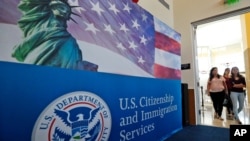
Emma is a 27-year-old Chinese national who is pregnant and living with her husband in New York. Emanuel, 23, lives in Virginia and is from Morocco. Peter, 31, moved from China in 2014. He resides in Houston, Texas.
Emma, Emanuel and Peter do not know each other, but they have one thing in common: Their international student immigration status is in jeopardy due to processing time delays in facilities overseen by the United States Citizenship and Immigration Services (USCIS).
At their request, VOA is only using pseudonyms.
These delays are affecting their ability to accept job offers because some employers are asking to see the receipt notice from their Optional Practical Training (OPT) application, which allows them to temporarily work in the country for up to a year in the field they studied.
The receipt notice is usually sent within weeks after initial intake at USCIS lockbox facilities. It is also the initial stage that takes place before any immigration petition can be reviewed and adjudicated by USCIS officers. Without it, the immigration agency is not able to find the applicant’s name or petition in their computerized record system.
“I'm just so stressed every day,” Emma told VOA. She graduated in 2020 with a master’s degree in engineering from New York University and sent her OPT application in October.
Ninety days before graduation, foreign students in the United States on F-1 visas can apply for the OPT.
“I felt relieved when I got a job offer. But because I don't even have a receipt number, and my employer doesn't really know what is going on, I just don't know how long I'm able to hold the offer,” she said.
VOA interviewed more than 10 students in the same situation and had access to chat rooms where hundreds more described reports of receipt notice delays at a Dallas USCIS lockbox facility. Because of their pending cases with USCIS, students requested that they remain anonymous or use pseudonyms.
Students with degrees in science, technology, engineering or mathematics (STEM) and who have been previously approved for OPT may be eligible for a 24-month extension if they meet all requirements.
Those applying for extensions must file for work authorization within 90 days of the end of the first OPT.
According to Jessica Behm, an immigration lawyer in New York, if a student can continue working with the same employer, that person has a 180-day grace period and can work with an expired authorization card and an approved I-20 while waiting for his or her case to be adjudicated. The I-20 is a document issued by a U.S. government-approved institution showing the student has been admitted to a full-time study program and demonstrated sufficient financial resources to remain in the United States.
First-time applicants
But first-time OPT applicants like Emma, Peter, and Emanuel never had a work authorization card and do not have grace periods.
Peter, a post-doctoral student at Texas A&M University, said his application was delivered to the Dallas lockbox on October 28. He has not received a receipt notice.
“I just finished my PhD a few weeks back. I'm actually working on renewable energy, and I just got a job in Houston. … My employer is fully aware of what's going on. I'm very transparent with them,” he said.
Depending on where an international student temporarily resides in the U.S., his or her OPT application is sent to a lockbox facility in Phoenix, Arizona, or in Dallas, Texas.
Increase in applications
In fiscal 2020, USCIS lockbox facilities processed more than 9.5 million applications.
Diane Rish, associate director of government relations at the American Immigration Lawyers Association, told VOA that receipt notice delays are also impacting applicants across a range of visa categories.
Rish said the “uptick” in filings is likely due to an influx of adjustment of status applications and cases filed before a USCIS fee rule for applications was set to go into effect on October 2, 2020. A federal judge blocked the guideline, and the government dropped an appeal of the decision.
For international students, the number of applicants who have been affected by delays remains unclear.
Behm said one of her recommendations is for students to use certified mail so they get a firm receipt that the application was delivered to a lockbox in a timely manner.
In an email to VOA, a USCIS spokesperson said the setback in responses is due to the ongoing coronavirus epidemic and a recent increase in requests for immigration benefits.
On January 8, USCIS announced that federal workers are working extra hours and that the agency is “redistributing its workload in order to minimize delays.”
“USCIS is actively determining appropriate methods to minimize those delays while prioritizing the health and safety of the agency’s lockbox workforce,” USCIS spokesperson Matthew Bourke said in a statement.
The immigration agency recommended that applicants submit forms online and create an online account to check the status of a case.
“Or attach a Form G-1145, E-Notification of Application/Petition Acceptance, to obtain receipt confirmation by email and/or text to help decrease relevant processing times,” Bourke said.
Peter said he filed the G-1145 form, but “I would only receive an e-notification when the lockbox enters my (OPT) case into the system.”
USCIS did not say what could happen to students who do not receive receipt notices in time to accept job offers.
For Peter, a gay Muslim, going back to China would mean hiding his religion and his sexuality.
“I've told my family not to disclose their religious beliefs. … For me, if I go home, I will have to hide multiple identities, like my sexuality and my religious beliefs, and that's really bad,” he said.
Failure to present a receipt notice also affects a student's ability to renew a driver's license in some U.S. states.
“That's another layer of complicating the overall situation. Many DMV (Department of Motor Vehicle) locations will not renew your driver's license without receipt notices. So, it's a separate issue from work eligibility,” Behm said.
Emanuel, who studied business administration at Northern Virginia Community College, applied for OPT to get some work experience before transferring to George Mason University in Virginia.
Emanuel said the situation has caused stress and anxiety, but because his family has paid for his education, he would like to leave the U.S. with some work experience.
According to NAFSA: Association of International Educators, the organization is aware of the delays at the lockboxes and they are in contact with the USCIS ombudsman.
Students said they have reached out to members of the U.S Congress, along with the USCIS Ombudsman’s Office, and even started a petition regarding problems at the Dallas lockbox in Texas.
“We understand that there are delays, but at the same time, we need a word from someone. … My plans were to receive my bachelor's degree and from there, make a decision (to stay or go back to Morocco), which is probably 100% now I’d like to go back (home),” Emanuel said.
See all News Updates of the Day
- By VOA News
Michigan State international students get their own space
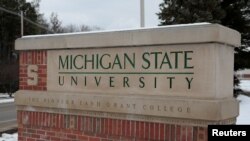
Michigan State University in East Lansing, Michigan, is setting aside a space in the International Center for international students.
Nidal Dajani, vice president of the school's International Student Association, said that the club plans to use the space to host events and hopes to collaborate with other student groups.
- By Dylan Ebs
International students find community during Pride Month
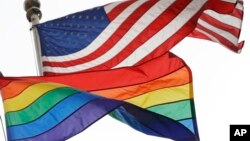
For LGBTQ+ international students, Pride Month, observed in June, is a unique time to reflect.
They hold on to multiple identities — both their LGBTQ+ identity and their cultural background — but coming to terms with them is not always easy.
For graduate student David Zhou, these identities can feel conflicting as transgender rights in China remain a controversial issue and spaces for LGBTQ people close. Zhou, 25, is transgender and pursuing an education in the STEM field at an urban university in the Midwestern United States.
VOA is using a pseudonym for Zhou’s first name and is not naming his university to protect his identity due to safety concerns back home in China. Zhou is not open about his transgender identity to his family.
During Pride Month, Zhou said he attended multiple LGBTQ+ events in his community and is surrounded by a supportive group of LGBTQ+ students who can relate to his experiences. But he’s not open about his identity to everyone on campus and said he doesn’t disclose his preferred pronouns to everyone to avoid transphobic comments.
“I feel like I have to make some judgments of the character of that person to see if they’re a good person to disclose [my identity] to,” Zhou said.
Zhou’s Pride Month celebrations included attending local markets with LGBTQ+ vendors and hanging out with his LGBTQ+ friends.
“They normalized being trans and for a long time I feel like trans identity is, should I say a vulnerability, brings me fear and worrying about discrimination, but having those events are helpful because it allowed me to see that queer people could just [live] openly,” he said.
At social events where few international students are present, Zhou said it can be tough to fit in.
“There's a lot of times like when they were talking about things I kind of, don't really understand, mostly because I kind of lack some background experience or knowledge,” he said.
Zhou said he is not aware of specific groups for LGBTQ+ international students at his university, but said international students are more prevalent in graduate programs and therefore find representation in organizations for LGBTQ+ graduate students.
In China, transgender individuals must obtain consent from an “immediate family member,” even for adults hoping to transition, which critics say limits the autonomy of transgender individuals while supporters say the policy protects doctors from violence by upset parents.
Struby Struble, a former coordinator of the University of Missouri LGBTQ+ Resource Center, told NAFSA: Association of International Educators in 2015 that LGBTQ+ international students face a “double barrier” on campus.
“With their international student friends, they feel isolated because they’re the LGBT one,” she said. “But then among the LGBT students on campus, they feel isolated because they’re the international one.”
Nick Martin, associate director of the Q Center, Binghamton University’s LGBTQ+ student support office, said when international students tour the center, there’s often a sense of hesitation as they enter a type of space that may not be present in their home country.
“I compare that to a year in after they've come into the space, they've again, maybe come to some of our events, they've got more connected,” he said.
Martin said graduate students have a unique interest in the Q Center as they may use the office for research and advocacy purposes that align with their studies.
“For older students, there may be hesitancy in a different way, but I think it's more in the vein of they want to do some of the advocacy work,” he said.
Martin said he thinks about how both his office and BU’s international student office can support students who come from countries with few — if any — protections for LGBTQ+ individuals.
“It's been a learning process of what those students really need, but I think I've kind of learned that a lot of students are just looking for the safe space that we offer,” Martin said.
- By VOA News
International students discuss US campus culture shock

International students at De Anza College in Cupertino, California, talked about culture shock in an article in La Voz News, the student newspaper.
"It felt like a major culture shock. Everything was so different, from academics to mannerism," said a student from Mexico.
Read the full story here.
These are the most expensive schools in the US
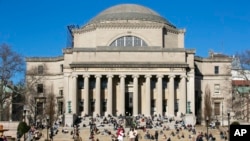
High tuition costs along with housing and food expenses can add up for students at U.S. colleges and universities.
MSNBC looked at the most expensive schools in the country, with one costing more than $500,000 for a bachelor’s degree. (June 2024)
Uzbekistan students admitted into top US universities
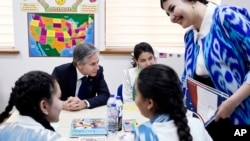
Students from Uzbekistan are among the international students admitted to top colleges and universities in recent years.
Gazata.uz profiled some of the Uzbekistan students attending Harvard, Brown, Princeton and other U.S. universities. (June 2024)






